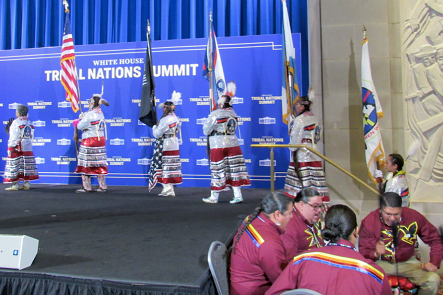
- Details
- By Chuck Hoskin Jr
Guest Opinion.This week, I am joining tribal leaders from across the country at the White House Tribal Nations Summit in Washington, D.C. The Summit is a testament to our government-to-government relationship with the United States. At the Summit, I will advocate for what Cherokee Nation needs to protect our sovereignty and what Cherokee families and communities need for health, safety and prosperity. Cherokee Nation will join other sovereign Indigenous nations to amplify our voice.
As sovereign nations, tribes can work directly with President Biden and other top U.S. officials on our shared goals in issues like health care, education and housing. Our unique access to federal officials during the White House Summit positions Cherokee Nation as an influential advocate for policies that benefit not only our citizens, but all of northeast Oklahoma.
 Make A Donation Here
Make A Donation Here
Last year during this gathering, which comes on the heels of Native American Heritage Month, we discussed key areas like public safety and justice, along with the protection of the Indian Child Welfare Act. In that first in-person summit since the COVID-19 pandemic, President Biden rolled out plans to increase federal agency consultations with tribes and to help revitalize Native languages.
Yes, we made progress in all these areas, but we have more work to do. The federal trust responsibility to tribes is a Constitutional principle that transcends presidential administrations and political parties. We know the U.S. government has yet to fully meet its trust responsibility, but federal policy has shifted toward supporting tribal self-determination to meet our people's needs. That is a welcome departure from historical attempts by the federal government to suppress our culture and destroy our governments.

Cherokee Nation is committed to the government-to-government relationship at this Summit and throughout the year. We participate in numerous tribal advisory committees (TACs), where tribal leaders meet directly with U.S. agency leaders on matters crucial to our tribes.
I recently participated in the Health and Human Services Secretary’s TAC, serve as the alternate from Eastern Oklahoma Region for the Department of Interior Secretary’s TAC, and chair the Health Resources and Services Administration’s TAC. Cherokee Nation Deputy Chief Bryan Warner chairs the Centers for Disease Control TAC. These positions make sure our voice is heard in national policies around public health, the health care workforce, upholding treaty rights, and more.
Building on our successful participation in TACs, the White House Summit enables us to advocate for lasting changes that will resonate for generations. During the Biden-Harris administration and for all future administrations, tribal voices must have a seat at the decision-making table for any policies that impact our communities. Through collaboration and continuing dialogue, Cherokee Nation is helping the federal government at long last live up to its promises.
Chuck Hoskin, Jr. is the principal chief of the Cherokee Nation.
More Stories Like This
Evidence, Not Emotion Protects Tribal SovereigntyWho Gets Hurt When SNAP Benefits are Stopped?
Expanding Food Security and Protecting Cherokee Elders
Governor Stitt, it’s raining. Save SNAP.
Remembering My Grandma During Native American Heritage Month
Help us tell the stories that could save Native languages and food traditions
At a critical moment for Indian Country, Native News Online is embarking on our most ambitious reporting project yet: "Cultivating Culture," a three-year investigation into two forces shaping Native community survival—food sovereignty and language revitalization.
The devastating impact of COVID-19 accelerated the loss of Native elders and with them, irreplaceable cultural knowledge. Yet across tribal communities, innovative leaders are fighting back, reclaiming traditional food systems and breathing new life into Native languages. These aren't just cultural preservation efforts—they're powerful pathways to community health, healing, and resilience.
Our dedicated reporting team will spend three years documenting these stories through on-the-ground reporting in 18 tribal communities, producing over 200 in-depth stories, 18 podcast episodes, and multimedia content that amplifies Indigenous voices. We'll show policymakers, funders, and allies how cultural restoration directly impacts physical and mental wellness while celebrating successful models of sovereignty and self-determination.
This isn't corporate media parachuting into Indian Country for a quick story. This is sustained, relationship-based journalism by Native reporters who understand these communities. It's "Warrior Journalism"—fearless reporting that serves the 5.5 million readers who depend on us for news that mainstream media often ignores.
We need your help right now. While we've secured partial funding, we're still $450,000 short of our three-year budget. Our immediate goal is $25,000 this month to keep this critical work moving forward—funding reporter salaries, travel to remote communities, photography, and the deep reporting these stories deserve.
Every dollar directly supports Indigenous journalists telling Indigenous stories. Whether it's $5 or $50, your contribution ensures these vital narratives of resilience, innovation, and hope don't disappear into silence.
 The stakes couldn't be higher. Native languages are being lost at an alarming rate. Food insecurity plagues many tribal communities. But solutions are emerging, and these stories need to be told.
The stakes couldn't be higher. Native languages are being lost at an alarming rate. Food insecurity plagues many tribal communities. But solutions are emerging, and these stories need to be told.
Support independent Native journalism. Fund the stories that matter.
Levi Rickert (Potawatomi), Editor & Publisher
